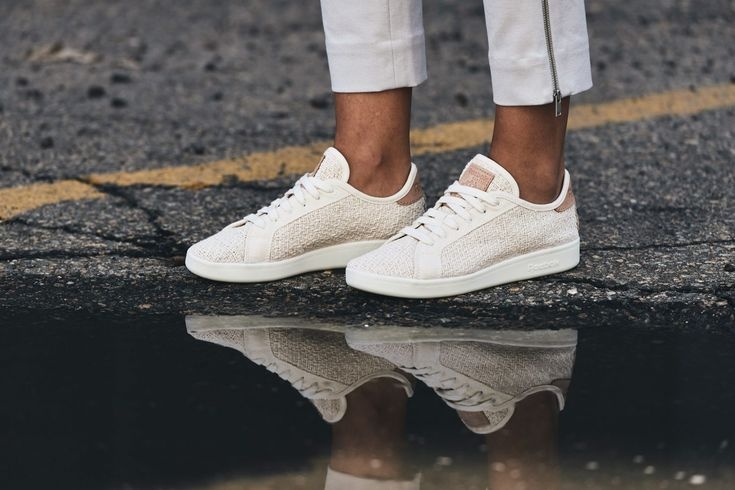In an era where sustainable fashion is more than a trend, sportswear brands are rethinking their impact on the environment. One of the most noteworthy initiatives in this space is Reebok’s Cotton + Corn Collection, a line of footwear designed to bring eco-friendly practices to the sneaker world. With this collection, Reebok has shown its commitment to sustainable design by crafting shoes made from renewable, plant-based materials rather than traditional synthetic components. The Cotton + Corn Collection is Reebok’s answer to the growing demand for responsible, sustainable products, showcasing the potential of bio-based materials in footwear.
The Idea Behind Cotton + Corn
The concept behind Cotton + Corn is simple yet revolutionary: create shoes made from materials that come from the earth and can eventually return to it. Instead of relying on conventional materials like plastics and synthetic rubbers, Reebok designed this collection using sustainable cotton for the upper part of the shoe and corn-based bioplastics for the sole. This choice aligns with the company’s goal to reduce dependency on petroleum-based materials, which have a significant environmental footprint.
Reebok has set out to produce a shoe that is not only stylish and comfortable but also biodegradable. This means that, after a long and useful life, these shoes will decompose far more easily than conventional sneakers, reducing landfill waste and contributing to a circular economy.
The Materials: Cotton and Corn
In the Cotton + Corn Collection, Reebok selected materials that are both renewable and responsibly sourced. The upper part of the shoe is crafted from 100% organic cotton, chosen for its softness, breathability, and renewable nature. Unlike synthetic fabrics, organic cotton is grown without harmful pesticides and requires less water than conventional cotton, making it a more sustainable choice. This cotton is responsibly sourced and meets Reebok’s standards for environmental responsibility.
The innovation in this collection, however, lies in the sole. Traditional shoe soles are made from rubber or petroleum-based synthetics, which are durable but environmentally costly. Reebok’s solution is to use a bioplastic derived from corn, developed in partnership with DuPont Tate & Lyle Bio Products. This corn-based sole is made from a renewable resource and offers a comparable level of durability and flexibility to conventional materials. By choosing corn as the foundation for the sole, Reebok can reduce the carbon footprint of its production process significantly.
Sustainable Manufacturing Practices
Reebok didn’t just stop at sourcing sustainable materials; the brand also re-evaluated its manufacturing practices to create a product with a lighter environmental impact. For instance, the collection is manufactured in facilities committed to reducing waste and conserving water and energy. By prioritizing sustainable practices at every stage—from sourcing to production to packaging—Reebok aims to minimize its ecological footprint.
The Cotton + Corn Collection also represents a shift toward transparency. Reebok is open about its materials and manufacturing processes, ensuring that consumers can make informed decisions about their purchases. This transparency is vital in the sustainable fashion movement, where consumers are increasingly interested in knowing the origins and environmental impact of their products.
Biodegradability and the Circular Economy
One of the most compelling aspects of Reebok’s Cotton + Corn Collection is its potential contribution to a circular economy. A key principle of circularity is designing products that can re-enter the environment or the supply chain after their useful life. Unlike traditional sneakers that take hundreds of years to decompose, the Cotton + Corn shoes are designed with biodegradability in mind.
Reebok has worked to ensure that each component of the shoe can break down more naturally, reducing the strain on landfills. While they’re not yet fully compostable, the collection is an important step toward creating a product lifecycle that aligns with the earth’s natural processes. Reebok’s commitment to circularity goes beyond just the product; the brand is also exploring ways to recycle and repurpose returned shoes, ensuring they are handled responsibly even at the end of their lifespan.
Challenges and Future Directions
While Reebok’s Cotton + Corn Collection is a significant achievement, there are still challenges to overcome. One of the primary obstacles is ensuring that bio-based materials can match the performance standards expected in the footwear industry. Durability and comfort are essential, and while the current bioplastic sole performs well, continued innovation is necessary to expand the capabilities of plant-based materials. Additionally, achieving full biodegradability is still a challenge in the footwear industry, where adhesives and other components often contain synthetic materials.
Reebok’s Cotton + Corn Collection is a valuable starting point, and the brand is already looking ahead. The company has expressed its commitment to further developing sustainable materials and refining production methods to improve the environmental impact of its products. As part of its larger sustainability goals, Reebok aims to make this type of bio-based shoe design a standard in its lineup, moving closer to the goal of producing fully compostable footwear.
Consumer Response and Market Impact
The Cotton + Corn Collection has garnered positive attention from environmentally conscious consumers and the sustainable fashion community. As more people seek out products that align with their values, Reebok’s collection represents a responsible choice that doesn’t compromise on style or comfort. This shift toward sustainability also serves as a message to other brands, encouraging the industry to consider eco-friendly practices and adopt similar initiatives.
The collection’s success shows that there is a demand for sustainable footwear, and as more companies take note, we can expect further innovations in plant-based, biodegradable shoes. By pioneering bio-based materials in footwear, Reebok is not only responding to consumer demand but also setting a standard for other sportswear brands to follow.
Conclusion
Reebok’s Cotton + Corn Collection is a promising step toward a more sustainable future in footwear. By focusing on renewable materials like organic cotton and corn-based bioplastics, Reebok has created a product that balances style, comfort, and environmental responsibility. Although challenges remain, this collection is a powerful example of how the footwear industry can innovate to reduce its environmental impact.
As Reebok and other brands continue to refine sustainable materials and production processes, eco-friendly options in footwear are likely to become more widely available. For now, the Cotton + Corn Collection serves as a model for sustainable design in fashion, showing that we can create high-quality, stylish products with the planet in mind.
Frequently Asked Questions (FAQ)
What makes Reebok's Cotton+ Corn Collection more sustainable than traditional sneakers?
The Cotton+ Corn Collection is designed with sustainability in mind by using renewable, plant-based materials instead of conventional synthetic components. The shoe's upper is made from 100% organic cotton, which is responsibly sourced and grown without harmful pesticides. The sole is crafted from a corn-based bioplastic, reducing reliance on petroleum-based materials.
Are Cotton+ Corn shoes biodegradable?
While the Cotton+ Corn Collection is designed to decompose more naturally than traditional sneakers, the shoes are not yet fully compostable. The organic cotton upper and corn-based sole improve biodegradability compared to petroleum-based alternatives, but some components, such as adhesives, still contain synthetic materials. However, Reebok is actively working on refining its materials and production methods to enhance biodegradability and support a circular economy.








